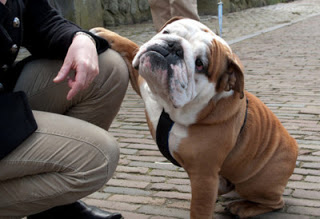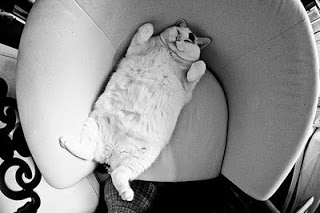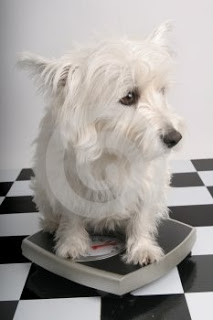Dogs
 Apparently, the prevalence of preventable diseases in pets such as Osteoarthritis, Type 2 Diabetes, Hypertension, Heart Disease, respiratory disorders, and some forms of cancer is directly related to the increase of obesity cases in both dogs and cats.
Apparently, the prevalence of preventable diseases in pets such as Osteoarthritis, Type 2 Diabetes, Hypertension, Heart Disease, respiratory disorders, and some forms of cancer is directly related to the increase of obesity cases in both dogs and cats.
Having a dog can be physically beneficial if the dog owner actually walks his/her pooch regularly. If you’re too lazy or too busy to go out and walk your dog or run with your dog, either you, your dog or both of you may be at risk of having a weight problem.
Another cause of obesity among pets is an unhealthy feeding routine. Pets have a tendency to overeat and pet owners have a tendency to overfeed. Some pet owners feed their dogs or cats with too much food than their caloric need or body requirement. Just like in humans, the average daily caloric need of a dog or cat will vary depending on its size, age, and breed.
 So how can you tell if your pet is overweight? APOP recommends the 1-5 scale Body Condition Scoring (BCS). The BCS is a recognized system used by veterinarians to determine whether there is a weight problem.
So how can you tell if your pet is overweight? APOP recommends the 1-5 scale Body Condition Scoring (BCS). The BCS is a recognized system used by veterinarians to determine whether there is a weight problem.
1 is considered to be an emaciated condition; 2 is thin; 3 is the ideal or normal; 4 is heavy or overweight; and 5 is extremely fat or obese. Check here for the complete details of BCS.
If your dog or cat has a sagging tummy, a broad back, has no waist and you can’t feel the ribs under the fat, your pet may have a weight problem. Dogs and cats that are overweight may experience difficulty in breathing or walking, are easily tired, and are often sluggish or sleepy.
Remember, the ideal weight range for dogs and cats differ depending on the size and breed. Take your dog to a certified veterinarian to diagnose and address the problem.
Don’t fall for the sad face. The hardest part about controlling a pet’s unhealthy eating habit is saying no when they try to ask or beg for food. But if your pet is overweight, the best way you can show your care is to help him/her regain the ideal body weight.

Introduce exercise or physical activity one step at a time. Never introduce your pet to a rigorous exercise program as this can be fatal to health. It’s best to ask advice from a vet as to what kind of exercise routine you should start with. At first, it should be short sessions doing a mild form of exercise and will slowly progress depending on your pet’s response.
Ask your vet for a healthy diet plan. Again, you cannot drastically change your pet’s feeding habits. Always work with a veterinary or pet nutritionist when introducing a new diet for your dog.
Don’t feed your dog under the table. Dogs must never be fed while the family is eating on the dining table. Teach your kids not to throw or feed bits of food to your dog under the table. Dogs should be trained to eat at their own feeding time. If you feed them at any time of day, they will be confused and they will have a more difficult time adjusting.
Be patient. Don’t expect your pet to reach the ideal body weight quickly. It needs time, patience, discipline and motivation. The important thing is to work closely with your vet and follow the health plan specifically created for your pet.
1. dog
2. cat

- How To Help Your Dog Or Cat Lose Weight
By Linda Cole An overweight dog or cat can struggle with many of the same health concerns overweight people have to deal with. There's nothing wrong with giving your pet a few TidNips treats now and then, especially when training, but we need to...
- What Is The Best Way To Feed Your Pet?
By the Drs4Pets Team There really isn’t a single “best” way to feed every pet. It is important to make adjustments to your feeding regimen to fit the lifestyle that you and your pet lead, as well as taking into account any health needs that your...
- Obesity In Pets: It’s No Laughing Matter
By Julia Williams People who aspire to be compassionate and/or politically correct wouldn’t dream of laughing at an obese person. Most of us are evolved enough to know this just isn’t funny. Yet, to my dismay I recently discovered that some people...
- Is My Dog Overweight?
Is your dog overweight? If your answer is "no", are you sure? Only 22% of owners believe their own pets to be overweight. But in reality, a 2011 study showed that 53% of dogs are overweight. This means that 31% of owners are in denial...
- Best Food For Obese Dogs
Obesity is not just a big problem for humans, it's also a huge health issue for dogs too. Being overweight not only makes them fat, it also makes them lazy and disinterested in activities around. Remember you haven't purchased a dog to make...
Dogs
Help Your Pet Recover from Obesity
Among humans, the problem of obesity is very real. Among pets, obesity is a problem often overlooked. Based on the Association for Pet Obesity Prevention’s (APOP) 2008 Pet Obesity Study, “an estimated 50% of dogs and cats in the United States are overweight or obese.”

Causes of Pet Obesity
It is interesting to note that pet owners who lead an inactive lifestyle are most likely to have overweight pets as well. The lack of physical activity can be unhealthy and even dangerous for humans and pets alike.Having a dog can be physically beneficial if the dog owner actually walks his/her pooch regularly. If you’re too lazy or too busy to go out and walk your dog or run with your dog, either you, your dog or both of you may be at risk of having a weight problem.
Another cause of obesity among pets is an unhealthy feeding routine. Pets have a tendency to overeat and pet owners have a tendency to overfeed. Some pet owners feed their dogs or cats with too much food than their caloric need or body requirement. Just like in humans, the average daily caloric need of a dog or cat will vary depending on its size, age, and breed.
Is My Pet Overweight or Obese?

1 is considered to be an emaciated condition; 2 is thin; 3 is the ideal or normal; 4 is heavy or overweight; and 5 is extremely fat or obese. Check here for the complete details of BCS.
If your dog or cat has a sagging tummy, a broad back, has no waist and you can’t feel the ribs under the fat, your pet may have a weight problem. Dogs and cats that are overweight may experience difficulty in breathing or walking, are easily tired, and are often sluggish or sleepy.
Remember, the ideal weight range for dogs and cats differ depending on the size and breed. Take your dog to a certified veterinarian to diagnose and address the problem.
Helping an Overweight or Obese Pet
Here are some tips to help your dog or cat recover from obesity:

Introduce exercise or physical activity one step at a time. Never introduce your pet to a rigorous exercise program as this can be fatal to health. It’s best to ask advice from a vet as to what kind of exercise routine you should start with. At first, it should be short sessions doing a mild form of exercise and will slowly progress depending on your pet’s response.
Ask your vet for a healthy diet plan. Again, you cannot drastically change your pet’s feeding habits. Always work with a veterinary or pet nutritionist when introducing a new diet for your dog.
Don’t feed your dog under the table. Dogs must never be fed while the family is eating on the dining table. Teach your kids not to throw or feed bits of food to your dog under the table. Dogs should be trained to eat at their own feeding time. If you feed them at any time of day, they will be confused and they will have a more difficult time adjusting.
Be patient. Don’t expect your pet to reach the ideal body weight quickly. It needs time, patience, discipline and motivation. The important thing is to work closely with your vet and follow the health plan specifically created for your pet.
1. dog
2. cat

- How To Help Your Dog Or Cat Lose Weight
By Linda Cole An overweight dog or cat can struggle with many of the same health concerns overweight people have to deal with. There's nothing wrong with giving your pet a few TidNips treats now and then, especially when training, but we need to...
- What Is The Best Way To Feed Your Pet?
By the Drs4Pets Team There really isn’t a single “best” way to feed every pet. It is important to make adjustments to your feeding regimen to fit the lifestyle that you and your pet lead, as well as taking into account any health needs that your...
- Obesity In Pets: It’s No Laughing Matter
By Julia Williams People who aspire to be compassionate and/or politically correct wouldn’t dream of laughing at an obese person. Most of us are evolved enough to know this just isn’t funny. Yet, to my dismay I recently discovered that some people...
- Is My Dog Overweight?
Is your dog overweight? If your answer is "no", are you sure? Only 22% of owners believe their own pets to be overweight. But in reality, a 2011 study showed that 53% of dogs are overweight. This means that 31% of owners are in denial...
- Best Food For Obese Dogs
Obesity is not just a big problem for humans, it's also a huge health issue for dogs too. Being overweight not only makes them fat, it also makes them lazy and disinterested in activities around. Remember you haven't purchased a dog to make...
